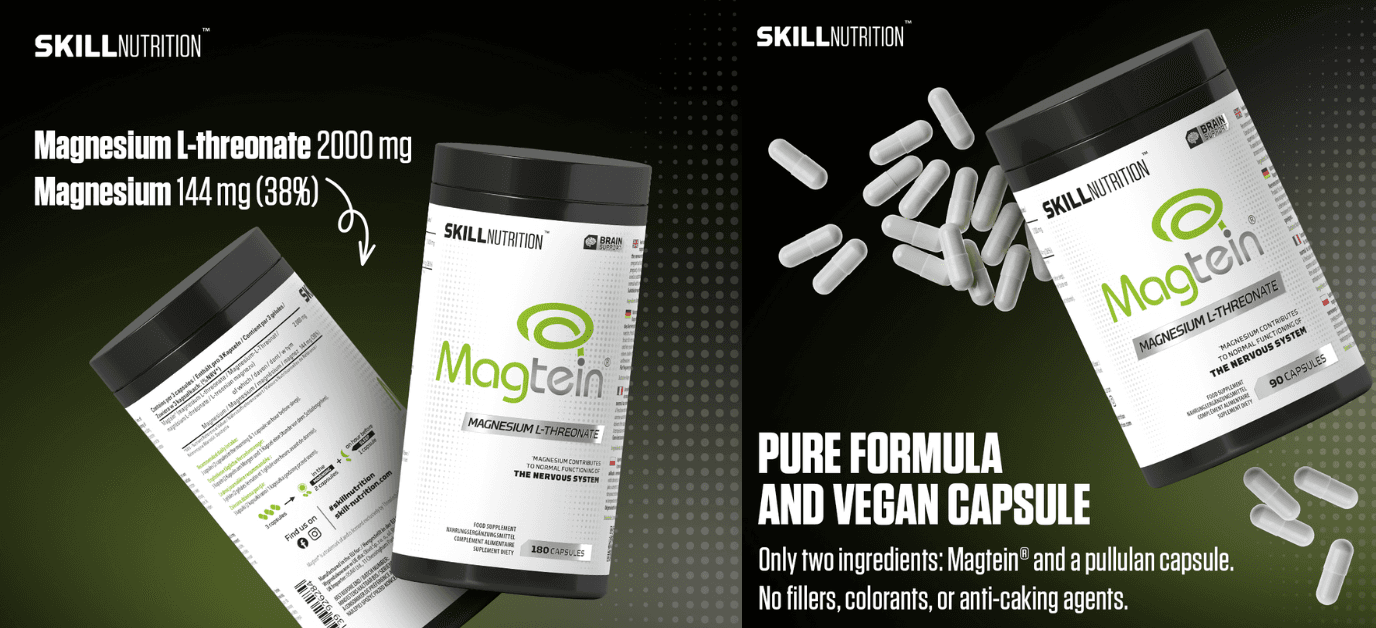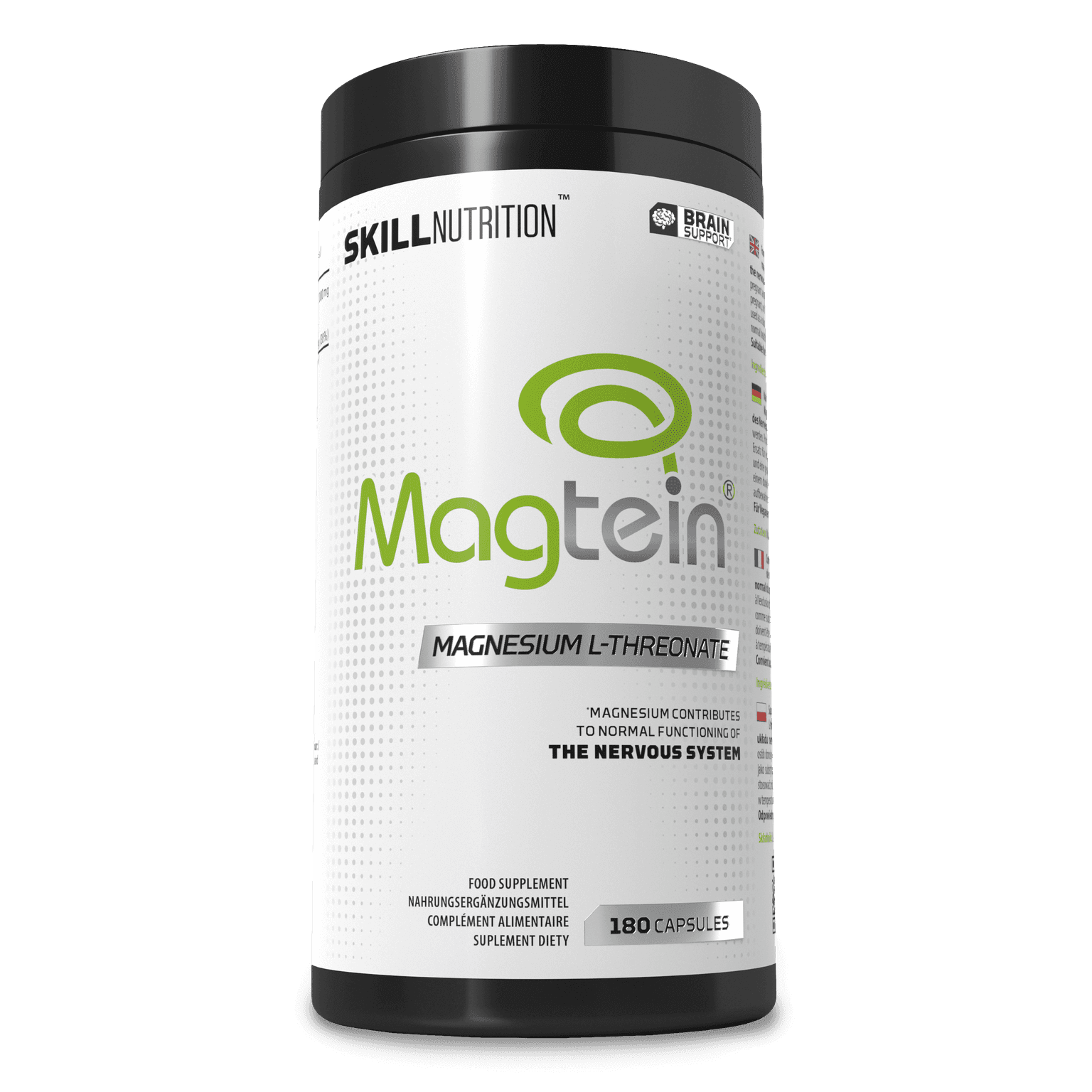

Magnesium L-Threonate (Magtein): What It Is and How It Works in the Body
20.11.2025Table of contents
Magnesium[1] L-threonate is a combination of magnesium and L-threonate ions. L-threonate is a substance that is produced when our body breaks down vitamin C. L-threonic[2]acid is the bonding agent used in the binding on the ions. Magnesium L-threonate is bioavailable and able to effectively cross the blood-brain barrier. This can lead to higher levels of magnesium in the brain.
Common magnesium is vital for our health and is often found in the forms of citrate and glycinate. Nuts, seeds, green leafy vegetables, whole grains, seeds, and legumes are good dietary sources of common magnesium. Yet, despite an abundance of of magnesium in food sources, it is possible to be deficient in it. Magnesium deficiency is rare, but we can have low magnesium levels if we don’t consume enough of it. This can leave us feeling weak, tired, and drowsy.
Why do our brain need magnesium?
Magnesium L-threonate is particularly efficient at delivering magnesium to our brain cells. Because of its bioavailability, it is significantly easier to absorb and maintain than other forms of magnesium. Generally, magnesium[3] is essential for brain health and mental well-being. It is a key source of energy and also has a role in protein synthesis and DNA repair. Of note, magnesium has an important role in nerve signal transmission (synaptic plasticity) and regulating our neurotransmitters.

Because of this, supplementing magnesium can enhance our cognitive function including memory and learning. It also reduces neuroinflammation[4] by activating certain cells and influence the expression of neurones to protect against neural damage. This helps to mitigate neurodegenerative disorders by preventing or slowing the progression of diseases like Alzheimer’s.
In addition, magnesium supports mood[5] regulation as it is a cofactor in the synthesis and function of neurotransmitters including serotonin and GABA. Serotonin and GABA are associated with improved mood, happiness, and calm. It also helps to regulate the hypothalamic [6]-pituitary-adrenal axis (HPA axis) which influences our stress response. Because of this, magnesium helps to reduce stress hormones like cortisol and mitigate the negative effects of stress.
How does magnesium L-threonate aid sleep?
There is evidence[7] that magnesium L-threonate supports improved sleep. Research has found that supplementing magnesium can improve sleep quality, rapid eye movement (REM) sleep, and induce relaxation. Magnesium is also involved in regulating sleep hormones such as melatonin. Melatonin [8] is a hormone that is naturally produced by the body and is responsible for regulating our sleep-wake cycles. By modulating our sleep hormones, magnesium L-threonate helps to decrease sleep latency which helps us feel more rested and refreshed upon waking.

How does magnesium L-threonate aid muscle function?
Magnesium L-threonate is essential for mitochondrial [9] function. As a result, it is associated with improved muscle function. It is known to influence nerve signalling pathways and therefore supports our nerve functioning and pain perception. It also have a role in calcium regulation. Calcium ions essential for muscle function and has a key role in muscle recovery. Calcium ions are released into our muscle fibres when a nerve signals our muscles to contract. The ions bond to proteins in our muscles which initiates the muscular contractions. After our muscle has contracted, calcium is pumped out of our fibres which helps them to relax.
Magnesium [10] acts as a natural calcium blocker. It is an antagonist to calcium, which helps our muscle to relax. It helps to reduce [11] the rate at which calcium binds to proteins in our muscles, which helps our muscles return to a relaxed and resting state. Maintaining a balance of magnesium and calcium is vital for healthy muscle function. Supplementing magnesium can therefore help to reduce muscle tension and the overall functioning of our muscles.
How much magnesium L-threonate do we need?
There is no official recommended daily amount. However, research [12] suggests a safe range of 1,000-2,000mg. This dosage provides around 144mg of elemental magnesium. It takes around 3 to 4 months of continued supplementation before you start to experience the full benefits. The recommended dose and benefits experienced is dependent upon factors such as age, gender, and the reason behind supplementation. As always, it is important to consult your general practitioner before introducing new supplements.
If you’d like to try Magnesium L-Threonate for yourself, Skill Nutrition offers a high-quality Magtein® formula designed for effective absorption and everyday support. Check it out and see the difference it can make.

Sources:
[1]https://pmc.ncbi.nlm.nih.gov/articles/PMC9786204/#:~:text=Phosphatidylserine%20(PS)%20is%20a%20natural,ability%20to%20communicate%20%5B22%5D.
[2]https://hmdb.ca/metabolites/HMDB0000943
[3]https://www.sciencedirect.com/science/article/pii/S2590142724000193#:~:text=Magnesium%2DL%2Dthreonate%20(MgT,magnesium%20%5B7%2C24%5D.
[4]https://pmc.ncbi.nlm.nih.gov/articles/PMC9820677/#:~:text=Magnesium%20(Mg)%20is%20involved%20in,the%20hallmark%20of%20neurodegenerative%20disorders.
[5]https://pmc.ncbi.nlm.nih.gov/articles/PMC11381753/
[6]https://pmc.ncbi.nlm.nih.gov/articles/PMC3198864/#:~:text=Preclinical%20and%20some%20clinical%20studies,abnormalities%20of%20the%20stress%20axis.
[7]https://pubmed.ncbi.nlm.nih.gov/39252819/#:~:text=Conclusions:%20This%20showed%20MgT%20improved%20sleep%20quality%2C,broader%20positive%20impacts%20on%20overall%20brain%20health.
[8]https://www.nhs.uk/medicines/melatonin/about-melatonin/#:~:text=Melatonin%20is%20mainly%20used%20to,is%20available%20on%20prescription%20only.
[9]https://www.sciencedirect.com/science/article/pii/S0028390816302040#:~:text=In%20cultured%20hippocampal%20neurons%2C%20threonate,promote%20cognitive%20abilities%20in%20human.
[10]https://pmc.ncbi.nlm.nih.gov/articles/PMC10745813/#:~:text=This%20important%20cell%2Dsignaling%20molecule,relaxation%20%5B77%2C85%5D.
[11]https://pubmed.ncbi.nlm.nih.gov/7286246/
[12]https://www.verywellhealth.com/magnesium-l-threonate-dosage-11781158




